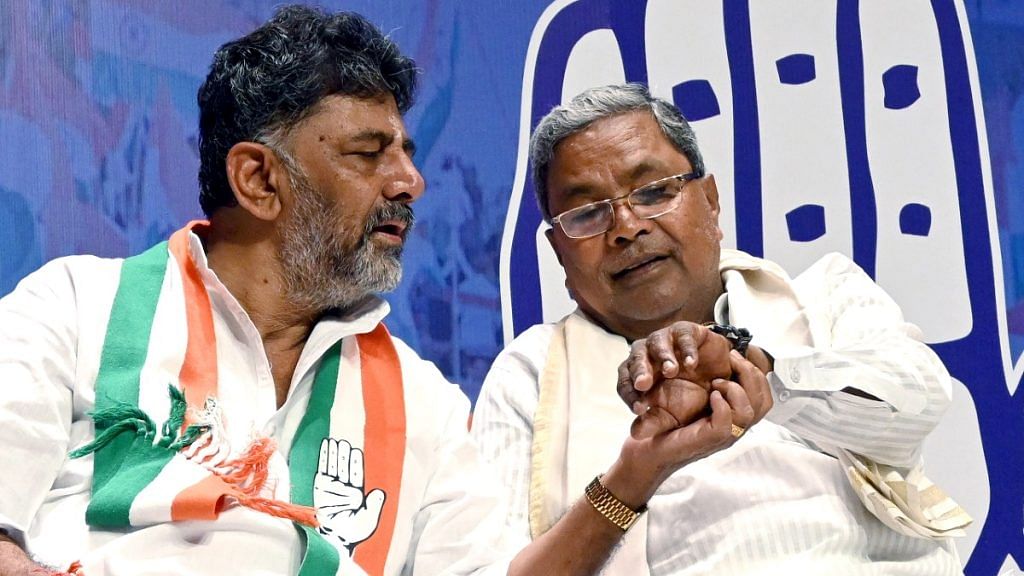Bengaluru: Having won the assembly elections with a clear mandate, the Congress could not have hoped to be in a better position in Karnataka. But a controversial infrastructure project in the state’s capital city of Bengaluru could now disturb the fragile peace between Chief Minister Siddaramaiah and his deputy, D.K. Shivakumar.
Shivakumar, who holds the Bengaluru city development portfolio, declared Tuesday that he would have gone ahead with the ‘steel bridge’ project conceptualised during the earlier Siddaramaiah government (2013-17).
Addressing a gathering in Sadashivanagar on the occasion of Kempegowda Jayanti celebrations, Shivakumar said, “There were many protests and people drummed up allegations of corruption and Siddaramaiah got scared. He (Siddaramaiah) and (K.J.) George (then Bengaluru city development minister) scrapped the project. I would have gone ahead with the project no matter the consequences.”
Shivakumar was referring to the 6.7 km-long flyover between Basaveshwara Circle and Hebbal Junction approved by the then Siddaramaiah-led Congress government in mid-2016 to curb congestion on the road leading to the Kempegowda International Airport.
Tenders were floated for the Rs 1,791 crore project, which was expected to be completed within 24 months.
The project — popularly called ‘steel bridge’ — was reportedly expected to have resulted in the axing of more than 800 fully-grown trees. At the time, this led to protests in Bengaluru by environmental activists who accused the government of eroding green cover merely to reduce travel time between the airport and different parts of the city by a few minutes.
Eventually, the then Congress government scrapped the project.
The Bharatiya Janata Party (BJP), then in the Opposition, had also alleged corruption and irregularities in the government’s handling of the project.
Shivakumar’s remarks have now revived the controversy over the proposed ‘steel bridge’, besides fueling the discord between him and Siddaramaiah, both of whom had staked a claim for the chief minister’s post in the wake of the Congress’s victory in the 13 May Karnataka assembly elections.
Though party sources have confirmed to ThePrint that the two reached an agreement that Siddaramaiah would vacate office for Shivakumar after two-and-a-half years, the Congress high command in Delhi is yet to issue an official statement in this regard. This ambiguity has given way to speculation of a rift between the party’s two tallest leaders in the state.
The BJP, now in the Opposition, has also questioned the fragile peace between them, claiming that the Congress government in Karnataka will be short-lived since the alleged rift between Shivakumar and Siddaramaiah could lead to its collapse.
Reacting to Shivakumar’s remarks, Karnataka Minister for Rural Development and Panchayat Raj Priyank Kharge told ANI Wednesday, “I wouldn’t say Siddaramaiah got scared. The CM is sensitive to public opinion. Sometimes, false narratives get floated and good decisions are delayed. I think that is what the deputy chief minister meant.”
Activists, meanwhile, are demanding an apology from Shivakumar for his remarks.
“Hello @DKShivakumar avare, please apologise for your statement. Who are you to bulldoze? Have you forgotten your oath to uphold the Constitution? This is a democracy, not a ಪಾಳೆಗಾರ ವ್ಯವಸ್ತೆ (Kannada for chieftain),” Vinay Srinivasa, an advocate and activist wrote on Twitter.
(Edited by Amrtansh Arora)
Also Read: One-upmanship in Karnataka BJP out in open as Yatnal, Bommai fight over ‘adjustment politics’
